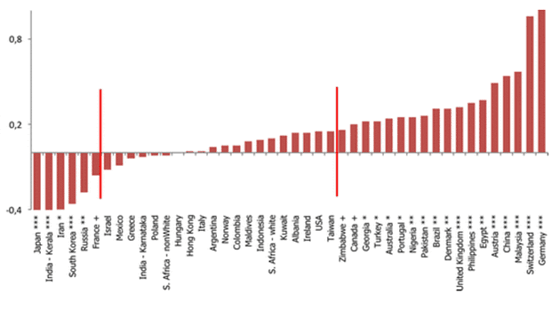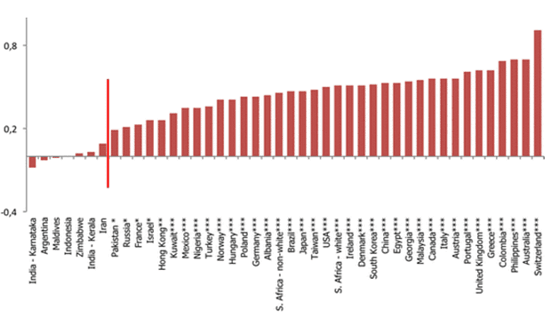Why do not the Russian people laugh?

byMelan Cholia
In Japan, seen as a sign of that is familiar and warmth directing a smile, but when different countries and cultures, or toward a smile to those who do not know, to make a smiling face at the time of the photo shoot will be regarded as a strange thing . Russians who grew up in the United States, "whether there is a culture is not the case with the culture to make why frequent smile?" And the results that have to wonder, has cited one study as one of the grounds.
Be Careful Where You Smile: Culture Shapes Judgments of Intelligence and Honesty of Smiling Individuals | Springer Link
https://link.springer.com/article/10.1007/s10919-015-0226-4/fulltext.html
Why Do Russians Never Smile? - The Atlantic
https://www.theatlantic.com/science/archive/2016/05/culture-and-smiling/483827/
I grew up in America with Russian parentsOlga KhazanWhen I took pictures with my friend I grew up being told that "smiling, cheese!" I was raised, but my parents constantly remember that when I took pictures they were stone-like expressions. According to Khazan, it is the same for relatives that do not show a smile at the time of photography, and furthermore, it seems that Russian women do not often say "more smile" to men.

byGorVlad
Khazan says that Russian people do not make a smile is not necessarily meaning "unhappy". Simply, laughing without a reason is not a Russian skill but seems to feel as if you are forced to keep intimacy when you smile. Russian frown faces appear abnormally for Americans who met for the first time, but those who just moved from Russia to the United States feel strange to be smiled by strangers.
As you can see from Khazan's example, how to catch a smile depends on culture.Polish Academy of SciencesHe is a psychologistKuba KrysHe is researching such a smile and points out that a smile can not be received as a sign of respect or warmth depending on the culture.
Mr. KrysAvoidance of uncertaintyWe conducted a survey focused on. Avoidance of uncertainty is a term indicating whether it is tolerant to ambiguous or unknown circumstances or a threat, and in countries where the tendency to avoid uncertainty is high, rules, mechanisms, and conventions to reduce uncertainty Is required. Meanwhile, in countries where the tendency to avoid uncertainty is low, there is a tendency to think that judicial systems, health care systems, safety nets, etc. have unstable social systems, so people think that the future is "unpredictable and uncontrollable" It is said that there is.
Since smiles are signs of certainty and trust, it is considered strange that people will smile in countries with low uncertainty avoidance tendencies. This is to make people smile as they know the fate to eat wolves, and in countries where the tendency to avoid uncertainty is low, smiles can be regarded as being an expression of being stupid Thing. When Krys is smiling in a country where everyone is trying to deceive each other, people say that they do not know whether they are turning their own good intentions or trying to cheat, "uncertainty In a country with a low avoidance tendency, I made a hypothesis that the smile is equal to frown. "

byMatheus Ferrero
In order to verify this hypothesis, Mr. Krys showed several photographs of thousands of people in 44 countries around the world, expressing smiling faces and non-smiling facial expressions. In each facial expression, "sincerity" and "intelligence" It was evaluated. As a result, in countries such as Germany, Switzerland, China and Malaysia, smiling photos were evaluated as being more intelligent than photographs of facial expressions that are not smiling. On the other hand, in Japan, India, Iran, Korea, Russia and others, we found that smiling photos tend to be evaluated as having low intelligence. Even though factors such as the economic situation are considered, there seems to be a relationship between society's uncertainty and "Smile is low intelligence".

On the other hand, in India, Argentina, Maldives and others, there was a tendency for smiles to be regarded as being related to dishonesty.

"This research shows that decadence at the societal level weakens the signal of things that have important meanings in evolution, like smiles," Krys says.
other than this,(PDF file)Another study, The possibility that the hierarchy and manhood of culture affects how to express emotions including smiles has been shown. About happinessCulture without weightThen, it is said that the frequency of smiling faces will also change. However, Khazan notes that there are multiple indicators to measure the avoidance of uncertainty, and that different results will be obtained if ranking each country is made by another method.
Related Posts:
in Note, Posted by darkhorse_log







